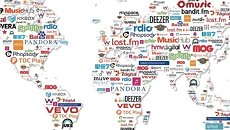News Posts matching #Advertising
Return to Keyword Browsing

PC hardware enthusiasts located in Germany, Poland and the United Kingdom have stumbled upon amusingly out-of-date AMD Radeon RX 9070 series GPU advertising. Earlier today, examples were
presented on the Radeon subreddit—the social media-sourced announcements provide another look at Team Red's new reference design (Made-By-AMD/MBA) for the RDNA 4 generation, but the accompanying text (translated to English) implies that gamers can "play now" on not-yet-released
Navi 48 GPU-based hardware. AMD has
officially delayed its launch of
Radeon RX 9070 XT and
Radeon RX 9070 (non-XT) cards into March, but older leaked information pointed to a possible January 23 (today) rollout.
This marketing campaign has seemingly kicked off prematurely—perhaps initiated by mistake. VideoCardz reached out to retail sources for comment—their report indicates that promotional material was ready to go, but embargoes are reportedly still in place. They reckon that a basic specification teaser could emerge online in the near future. Board partners have already distributed products across retail networks, and
finalized units have been unboxed—today's advertised claim of "immediate availability" is no longer valid, but many folks hoped for a pre-January 30 kick-off. NVIDIA will be launching its GeForce RTX 50 series at the end of this month, but
industry soothsayers believe that things will not go smoothly.

Inference software enables shift to NVIDIA A100 Tensor Core GPUs, delivering 7x throughput for the search giant. Jiusheng Chen's team just got accelerated. They're delivering personalized ads to users of Microsoft Bing with 7x throughput at reduced cost, thanks to
NVIDIA Triton Inference Server running on
NVIDIA A100 Tensor Core GPUs. It's an amazing achievement for the principal software engineering manager and his crew.
Tuning a Complex System
Bing's ad service uses hundreds of models that are constantly evolving. Each must respond to a request within as little as 10 milliseconds, about 10x faster than the blink of an eye. The latest speedup got its start with two innovations the team delivered to make AI models run faster:
Bang and
EL-Attention. Together, they apply sophisticated techniques to do more work in less time with less computer memory. Model training was based on Azure Machine Learning for efficiency.

We wouldn't be where we are today without the developer community. Together, we've been on a
journey to reimagine an
open app store and provide a better experience for Windows customers. It's because of this partnership that the Microsoft Store on Windows is now used by over one billion customers with more than 50% of new Windows 11 customers engaging with the Microsoft Store in the first 30 days. The momentum of Windows customers is a testament to the growth in quality content from our passionate community of developers, who have more than doubled the number of Win32 and PWA apps since last year.
Engaging PWAs like Snapchat and ESPN, sophisticated native apps like Spark Mail, Adobe Photoshop and Lightroom, Capture One, Bilibili and WhatsApp, along with Android apps like Epic Seven, Best Fiends, and Blink, are truly what makes the Microsoft Store the best place to find the right content, whether for productivity, entertainment or creativity. There are many more apps to recognize, including the winners of the Microsoft Store Awards 2023 which can be found
here. We are proud to share the next phase of our journey for the Microsoft Store on Windows and announce new experiences, features and tools. We are focused on building an open store that is ready for the new AI era, and to provide developers with new tools like Microsoft Store Ads to reach even more customers.

Intel Corporation's biggest marketing campaign in nearly a decade kicks off this week with television commercials, online experiences and print ads that the company is hailing as "cinematic and epic."
The multi-faceted global campaign, called "A New Era of Computing," is aimed at marketing the Ultrabook experience in exciting and innovative ways to consumers. Valued at hundreds of millions of dollars, the campaign is the largest marketing spend for the company since launching Intel Centrino in 2003.
Opera Software announced today that it has acquired Mobile Theory Inc. and 4th Screen Advertising, Ltd., to significantly expand its offering to advertisers and mobile publishers that engage consumers via the mobile web and applications, across all mobile platforms. Opera offers complete advertising solutions for mass-market feature phone and smartphone platforms, including iOS, Android, Blackberry, Java and Symbian.
Additionally, these acquisitions will enable Opera to better monetize the traffic that flows through Opera Mini and Opera Mobile browsers. With the world's most popular mobile browser, Opera serves more than 160 million monthly active users that generate more than 100 billion page views, and consume more than 16 Petabytes of mobile data services a month, as of December 2011.

Singapore-based company Artivision Technologies has announced that its wholly-owned subsidiary ArtiMedia Pte signed a Memorandum of Understanding (MOU) with chip titan Intel Corp. This MOU will allow Artimedia's front-end in-video advertising platform and back-end advertisement serving technology to be incorporated into Intel's Software Development Kit (SDK) that has Intel's "Wi-Fi Direct" technology (Wi-Fi Direct enables mobile and other devices to connect directly with each other and to transfer and share content like images, pictures and videos).
A definitive agreement between Intel and Artimedia is expected to be inked once "the first working SDK with Artimedia's front-end and back-end technology is deployed on a demo mobile device." The final agreement will cover the license fee per installation in each Intel platform, an equally-split revenue sharing model and a non-competition commitment. Moreover, Intel Capital will be given the first opportunity to invest in Artimedia.

Yes, that's right, SOPA might have been set back for now, but the vested interests from the big media corporations (music/movies/news etc) that want it implemented unsurprisingly aren't sitting idle and are pushing for ever more draconian measures aka 'SOPA Plus'. A
digital music report (PDF) asks for everything that was in the original SOPA and then some, with a wishlist of seven 'fixes':
Gearbox Software has reached a deal with advertising company Double Fusion to bring in-game advertisements to some of its future titles. Double Fusion will be providing the developer with dynamic advertising technology to deliver the ads and integrated sponsorships, although Gearbox has not yet disclosed which games will contain these adverts. The companies commented that they will "work together to ensure that all advertising programs are appropriate and add value to the gamers' experience." In-game ads look set to become more common over the next few years, with big names such as Microsoft and EA already having agreed to similar deals.

The whole "Vista Capable" sticker scandal was a mess, pure and simple. However, new evidence has prompted a new anti-trust lawsuit against Microsoft. It would seem as though it's entirely plausible that Microsoft was indeed trying to pull a fast one past Vista customers. Everyone who was shopping for a PC, or used a relatively-new PC a couple months before the Vista release probably saw that it came with a "Vista Capable" sticker. The new evidence shows that Microsoft may have planted Vista Capable stickers on computers not ready to run Vista at all, be it the premium version or the normal version. Men from inside Microsoft did everything from reprimand members of marketing to scoff at retailers who sent letters of concern to Microsoft. We'll keep you posted on what exactly comes out of this lawsuit. If you bought a "Vista Capable" computer with a "Vista Capable" sticker on it, you may just qualify for a settlement if this case comes through for the prosecution.
In short, it has been a very bad week for Microsoft.
For the past several years, advertisers have been trying to get new customers by throwing advertisements of their products in their faces. They do this by way of pop-ups, vibrant banners, in-line text, and other crazy methods. A recent survey proposes that customers listen to almost none of that. In fact, most customers were more likely to avoid a product if the advertisement annoyed them. Instead, what really gets consumers to buy a product is positive customer reviews, forums, blogs, and other forms of product recommendations on a more personal level. As if in support of this, other studies conclude that offline influences of purchases are, in order from most to least influential, the recommendation of a friend, magazine/newspaper editorials, salespersons advice, press advertising and clever TV advertising.

While companies probably get plenty of advertising revenue from putting previews in behind DVD movies, IBM seeks to go above and beyond the call of duty. IBM recently applied for a patent. If granted, IBM would own the means to essentially place commercials
in the middle of a DVD movie. You can read the exact workings of this new system by reading the
patent. IBM argues that such invasive and interruptive methods of advertising "may be a great source of advertising revenues that are not being tapped...revenues from DVD advertising may contribute to the reduction in cost of the DVDs." Of course, if IBM does start flooding DVDs with unwanted advertisements, chances are users will make their DVDs extremely cheap...by pirating them, thus avoiding the advertisements in the first place.

The once-famous Ben Curtis was a great advertising man for Dell. His well-known "dude you're getting a Dell" campaign gave people a good laugh, and brought Dell a healthy amount of revenue. That all changed when Curtis was caught buying marijuana, which is illegal in the United States of America. Dell fired Curtis, and he has since been pressed to find a good job. Fortunately, this was not the end of the line for Curtis. Curtis is now a bar tender in New York, and is quite happy with his new job. "There were times when I made boatloads of money as an actor, but here I can be myself." Curtis aspires to one day score it big with his band, "Whale", and once again get boatloads of money in Hollywood.

Back in February, when Vista was just starting to gain momentum in the PC world, people got a nasty surprise when installing Vista Home Premium or higher on a 'Vista Capable' PC (instead of a 'Vista Premium Ready' PC): if it installed at all, it ran as slow as molasses, and features that people paid for such as Aero and Windows Media Center did not work, due to higher system requirements. This misconstrued marketing angered consumers over time, and now Microsoft is facing a class action lawsuit. Microsoft asked for the case to be thrown out, but a Federal judge agreed to hear the case just last Tuesday. The trial is scheduled for October, but we should see Microsoft settling this case long before then.

While a lot of people would say that Intel's Core 2 Duo series advertises itself, Intel thinks that a little help from PR doesn't hurt. Unfortunately, Intel's latest advertisement seems to be a little racist. As The Inquirer puts it, the advertisement...
shows a white IT manager looking pretty pleased with himself, having successful managed to "multiply computing performance" and "maximise the power" of his employees. For some bizarre reason, the employees are all depicted as black athletes, crouched as if starting a sprint race - but also appearing to all bow down before the smug white dude.
Public response to this advertisement ranges from "stupid ad but not racism" to "This one is a s*** storm waiting to happen". On a side note, the people over at
Gizmodo, who caught the possible racism, feel that the advertisement "might be racist, but boy does it make me want a Core 2 Duo."

It's no secret that as of late, Microsoft's Windows Vista isn't doing very well. Despite Microsoft claiming record sales figures, buyers have all too much negative feedback, which is severely affecting investors confidence in Microsoft. Steve Balmer, the CEO of Microsoft, recently had a figurative pep rally (Microsoft's annual financial analyst meeting)to regain investor confidence. Balmer first addressed investor confidence in Vista. "Vista doesn't get done by three people in a garage in three days," said Steve Ballmer. The company is making big bets, and some of them will take time to develop. "A great misconception in the tech industry is that most successes happen overnight," he said.
Steve Balmer then reminded investors of recent company successes that Microsoft intends to build on, which includes advertising and devices. "We are hell bent and determined to allocate the talent, resources, money, and innovation to become a powerhouse in the advertising business."

Google Inc. is expanding a test program that lets online advertisers buy ad space in newspapers, as the publishing industry struggles to offset business that has moved to the Internet. An initial test phase of Print Ads was launched by Google last November, linking about 100 advertisers with over 50 newspapers. Late Tuesday the Mountain View company stated that it will open the program to the "hundreds of thousands" of U.S. advertisers and agencies that use its online ad platform, AdWords. Newspaper publishers including Hearst Corp., The New York Times Co. and E.W. Scripps Co., have increased the number of daily newspapers involved in this project to 225.
Neil Postlethwaite, Managing Director for Splash Damage, came onto the ET:QW official community site yesterday to make the announcement. In order to bring not just basic bug patches but continuous refinements and improvements to what the company hopes will be a long-standing multiplayer experience, the developer has gone the route of In-game advertising.
"For the last four years, we've put all of our effort into making Enemy Territory: QUAKE Wars. So, we're not planning to ship this game and walk away. We want to keep supporting ETQW in as many ways as possible. We'll be maintaining the persistent stats servers and the community site, and continuing to support ETQW with updates and improvements," Neil said in his post.
In his comments, he also made sure to cover privacy concerns regarding the advertising. "The company providing the ad system does not and will not store any personal information or data that otherwise can be used to identify you. All they track is if and how long you look at the advertisements." Whether that will be enough to quell the privacy critics or not has yet to be seen, but at least the comments so far have been largely positive.

Now that both Mac OS X and Windows Vista have widgets, or cool little gadgets you can spread around your desktop, ad companies have decided to try their hand at widgets. These ad-widgets would probably be put into a widget that actually does something, such as check facebook/myspace/sports statistics. Whether or not these advertisements would actually do anything would be hard to determine, considering tracking these widgets would be extremely illegal.

Microsoft is beginning to get a reputation for having its console ads banned, with the latest advertisement being banned because of the image created over dangerous driving. The ad featured a street car chase but has been withdrawn from the air in the UK after a statement by the Advertising Standards Agency. "We were concerned that the ad gave the impression that reckless street car racing was exciting and fun, and considered that was compounded by the congratulations offered to the other driver at the end of the race by the other young men involved," said the ASA, and although Microsoft argued that the ad gave a note at the end informing watchers that the stunts were performed in a controlled environment, this wasn't enough for the ASA. This other banned Xbox ads, including the recent "Jump In" advert for the 360 with the invisible guns, and the "Life is Short" advert for the first Xbox which most people should remember with the flight to the coffin.
About a week ago, Turner broadcasting tried to promote
Aqua Teen Hunger Force in Boston. However, this creative advertising, which involved hiding blinking electronic devices around the city, went dreadfully awry. The devices were misinterpreted as a terrorist attack, drawing a police response similar to 9/11. Public transportation, including entire roads and rivers, effectively halted as the city descended into a panic. At the height of the alert, Boston authorities mobilized bomb squads, federal agents, the coast guard, hundreds of officers, and emergency crews. Red faced, Turner broadcasting and marketing firm Interference agreed to pay $2 million USD as compensation for the disturbance.
MySpace ads have been taking a very interesting turn as of late. Ads for WinAntiVirus Pro and DriveCleaner are taking a new approach to getting people to buy things. Symantec and Sophos have warned that both programs are malicious, which raises questions as to why MySpace allows ads for them in the first place. WinAntiVirus Pro tries to install itself in the background via ActiveX. When it is installed, it claims you have a malware problem and makes you buy the anti-virus program it recommends. DiskCleaner pulls a similar stunt, however it claims there is a problem with your computer before it installs itself and demands you buy the professional version.
StormWorm shows a disturbing new trend of malware authors- playing off victim's fears. Instead of using classic baits of sex or celebrity information, malware authors are using a hot news event to get people to click their links. Malware authors are sending emails with the subject "230 dead as storms batter Europe", which has a link to the storm worm where a news story ought to be. Security firm F-Secure says that the worm is just a variant of Small.DAM, but it definitely has an unusual install approach.
Microsoft has recently been competing with search giants such as Google for advertising money. And so, like what Google does in Gmail accounts, Microsoft is adding 'behavioral targeting', or personalized ads, to it's advertising campaign. What that means is that Microsoft will report their users' search habits, sorted by demographics, to advertisers. The advertisers can then use this data to create advertisements based on what the demographics search for. Search engines such as Google and Yahoo also use personalized advertising.
Verizon Wireless, one of America's most heavily advertised wireless phone carriers, has recently decided to see how much money they can make in the mobile advertising department. Considering that advertisers spent $45 million in 2005 and $150 million in 2006 on phone ads from various other carriers, mobile advertising really should take off this year. The market is predicted to be worth $1.3 billion by 2010. Verizon is working hard to find places to put that ads so that while they will still be on news, weather, sports and other internet sites, they will not be intrusive.
Personalised advertising seems to be the new phase in technology, with a small number of games, namely Battlefield 2142, taking advantage of this. Now mobile TV broadcasters in Norway are giving personalised advertising a try for two months, which could soon find its way to other countries if it proves a success. It seems to work by tracking your location and sends relevant ads that may be related to local shops and services. Although some people will find it intrusive, it could potentially lead to cheaper mobile TV prices.
Return to Keyword Browsing




















